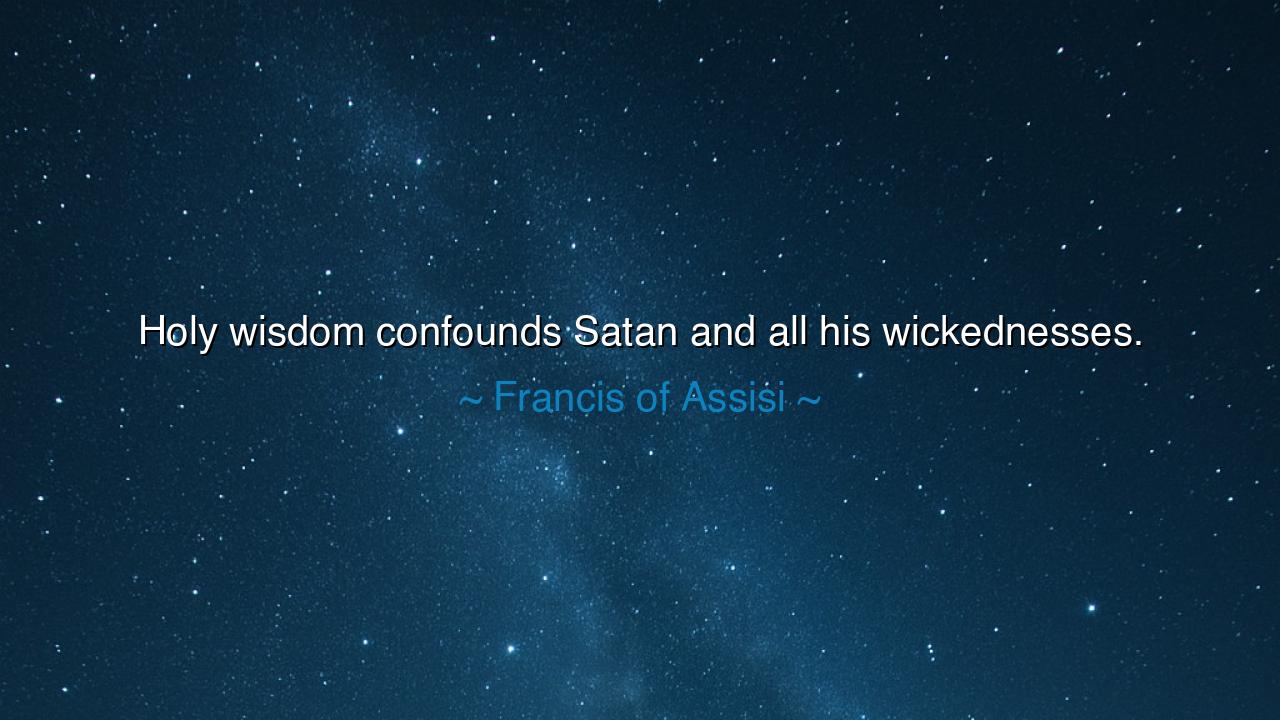
Holy wisdom confounds Satan and all his wickednesses.






Listen well, O children of the future, for I bring to you the wisdom of Francis of Assisi, who declared: "Holy wisdom confounds Satan and all his wickednesses." These words speak to the enduring power of divine wisdom—a force so pure and righteous that it stands in opposition to the forces of evil. Holy wisdom, born of the divine and imparted through faith, is not merely knowledge, but a force that illuminates the darkness, revealing the truth and shattering the lies that bind the soul. Where evil seeks to deceive, holy wisdom confronts it with clarity and strength, unraveling its deceit and rendering it powerless.
Consider the life of Francis himself, whose deep connection to God and unwavering commitment to humility made him a beacon of light in a world overshadowed by greed, pride, and corruption. Francis, in his devotion, found that it was not force or violence that could defeat the wickedness of the world, but the quiet wisdom that came through compassion and service. He encountered the darkest forces of evil—from the temptation of pride to the challenges of poverty—yet he overcame them all by embracing holy wisdom, which guided him on a path of peace and love. His humility and faith confounded the Satanic forces that sought to lead men astray, showing the world that true power lies in righteousness, not in worldly might.
Think, too, of the ancient story of Job, who, in his suffering, was tempted by forces both human and divine to forsake his faith. Though Satan sought to strip him of his belief in God's goodness, Job held steadfast to his faith and, in doing so, found a deeper understanding of wisdom—the wisdom that lies in trusting in God's plan, even when the world seems dark and hopeless. In his endurance, Job proved that holy wisdom has the power to confound evil, to turn suffering into a source of strength and understanding. It is through faith and wisdom that one can endure the trials of life and emerge triumphant over wickedness.
In more recent times, think of the great leaders who, in the face of evil, relied not on brute force, but on wisdom and integrity. Martin Luther King Jr., facing the wickedness of racism and violence, wielded the power of nonviolence, drawing upon the deep well of divine wisdom. Through his faith and understanding, he confronted the darkness of prejudice and hatred, showing that it is not through destruction, but through love, that evil is defeated. His wisdom, like that of Francis, confounded the forces of evil, offering the world a path to justice and peace.
So, O children, remember this: holy wisdom is not just a form of knowledge; it is the very light that shatters the darkness of the world. It is a force that confounds evil, whether it comes in the form of pride, greed, or hatred. Satan and his wickednesses may loom large in the world, but they are no match for the power of divine wisdom, which is found not in earthly power, but in humility, faith, and the courage to walk the path of righteousness. Let your hearts be filled with this wisdom, for it is through it that you will find the strength to overcome all the forces that seek to lead you astray. Holy wisdom is the true power that will guide you toward truth and victory over evil.






PNduy phuong ngo
Francis of Assisi’s quote about wisdom defeating evil seems like a deep spiritual belief in the strength of divine insight. But I also wonder—how does this idea hold up in practical terms? Does wisdom always conquer evil, or are there times when evil seems to triumph despite wisdom? Is there a balance between wisdom and action, or can wisdom alone truly be enough to face life’s darker moments?
HTHang Thanh
I think Francis of Assisi’s quote suggests a profound belief in the power of goodness to overcome darkness. Wisdom, in this context, seems almost like an armor that protects the soul. I’m curious, though—does wisdom alone have the power to fight evil, or is it the actions we take, inspired by wisdom, that make the difference? Can wisdom be the starting point for good deeds, or does it require more than just insight to make a real impact?
TTthu thu
This quote about ‘holy wisdom’ from Francis of Assisi strikes me as a reminder that true wisdom isn't just intellectual—it’s deeply spiritual. I wonder if that makes wisdom feel more elusive to some people. Can anyone access this ‘holy wisdom,’ or is it reserved for those with a strong spiritual connection? How do we differentiate between everyday wisdom and this divine wisdom that’s supposed to have the power to defeat evil?
TCNguyen The Cuong
I find it fascinating that in this quote, Francis of Assisi connects wisdom directly to defeating evil. It seems like wisdom isn’t just a virtue; it’s a protective force. But what does this mean for people who don’t necessarily subscribe to a religious or spiritual framework? Can wisdom, in any form, have the same power to counteract negativity or evil in those contexts, or is the concept tied specifically to faith in this case?
KLle thi kieu linh
Francis of Assisi’s view of wisdom as something that can thwart evil is intriguing. It brings up the question of what the ‘wickednesses’ represent. Does this quote suggest that wisdom is the antidote to all forms of evil, whether they’re internal struggles or external conflicts? It’s an empowering thought, but I’d love to know—how does one cultivate this kind of wisdom in daily life? Is it something we can actively seek or does it come through spiritual practice?